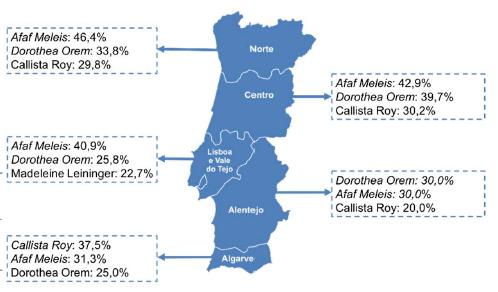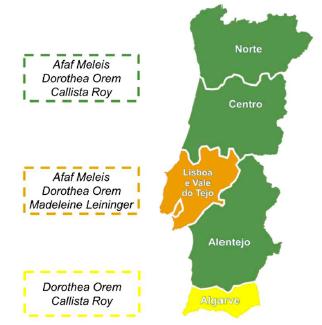Serviços Personalizados
Journal
Artigo
Indicadores
-
 Citado por SciELO
Citado por SciELO -
 Acessos
Acessos
Links relacionados
-
 Similares em
SciELO
Similares em
SciELO
Compartilhar
Revista Portuguesa de Enfermagem de Reabilitação
versão impressa ISSN 2184-965Xversão On-line ISSN 2184-3023
RPER vol.1 no.2 Silvalde dez. 2018
https://doi.org/10.33194/rper.2018.v1.n2.02.4409
Articles
Conceptual Guidelines Of Rehabilitation Nurses In Portuguese Hospitals
1- Escola Superior de Enfermagm do Porto - CINTESIS
2- Escola Superior de Saúde de Santa Maria - CINTESIS
Objective:
To identify the most consensual conceptions of nursing, individuals, health and environment among the nurses who are specialists in rehabilitation nursing.
Method:
A quantitative, descriptive-exploratory study was carried out in 36 hospital institutions, and 306 specialist nurses were involved in this research. As a tool for data collection, it was performed a self-completion questionnaire.
Results:
Although there are differences in the five regions of the country, the nursing, individuals, health and environment conceptions that nurses in rehabilitation nursing designate as fully in accordance with their practice are those of Afaf Meleis, Dorothea Orem, Callista Roy and Madeleine Leininger.
Conclusion:
The congruence observed in the results regarding the different conceptions shows the consistency of the conceptual guidelines of the participants. In this sense, the challenge is consolidating the support of the professional practice of nurses who are specialists in rehabilitation nursing in the theoretical frameworks whose conceptions are considered fully in accordance with their practice.
Descriptors: Nursing; Rehabilitation; Nursing Models
Objetivo:
Identificar as conceções de enfermagem, pessoa, saúde e ambiente mais consensuais entre os enfermeiros especialistas em enfermagem de reabilitação.
Método:
Estudo quantitativo, descritivo-exploratório, realizado em 36 instituições hospitalares, com a participação de 306 enfermeiros especialistas. Como instrumento de colheita de dados utilizou-se um questionário de autopreenchimento.
Resultados:
Apesar de existirem diferenças nas cinco regiões do país, as conceções de enfermagem, pessoa, saúde e ambiente que os enfermeiros especialistas em enfermagem de reabilitação qualificam como totalmente de acordo com a sua prática são as de Afaf Meleis, Dorothea Orem, Callista Roy e Madeleine Leininger.
Conclusão:
A congruência observada nos resultados relativamente às diferentes conceções revela a consistência da orientação concetual dos participantes. Neste sentido, o desafio passa por consolidar a sustentação do exercício profissional dos enfermeiros especialistas em enfermagem de reabilitação nos referenciais teóricos, cujas conceções são consideradas como totalmente de acordo com a sua prática.
Descritores: Enfermagem; Reabilitação; Modelos de Enfermagem
Objetivo:
Identificar las concepciones de enfermería, persona, salud y ambiente más consensuadas entre los enfermeros especialistas en enfermería de rehabilitación.
Método:
Estudio cuantitativo, descriptivo-exploratorio que se realizó en 36 instituciones hospitalarias, con la participación de 306 enfermeros especialistas. Como instrumento de recogida de datos, se utilizó un cuestionario de auto relleno.
Resultados:
Aunque existen diferencias en las cinco regiones del país, las concepciones de enfermería, persona, salud y ambiente que los enfermeros especialistas en enfermería de rehabilitación califican como totalmente de acuerdo con su práctica son las de Afaf Meleis, Dorothea Orem, Callista Roy y Madeleine Leininger.
Conclusión:
La congruencia observada en los resultados con respecto a las diferentes concepciones revela la consistencia de la orientación conceptual de los participantes. En este sentido, el desafío pasa por consolidar la sustentación del ejercicio profesional de los enfermeros especialistas en enfermería de rehabilitación en los referenciales teóricos cuyas concepciones son consideradas como totalmente de acuerdo con su práctica.
Descriptores: Enfermería; Rehabilitación; Modelos de Enfermería
INTRODUCTION
Currently, there has been a consensus that Nursing cannot move towards meeting its social commitment if there is no clarity about its disciplinary bases. This is because, without clear disciplinary guidance and a basis to guide professional practice, it is easy to lose track. In this context, all nurses are invited to support their professional practice within the framework of the discipline, which even though existing in theory, remain apart from practice. Otherwise, nurses are at risk of reverting to excellent technical professionals 1. Whenever possible, theory should have global relevance, covering both generic and specialized domains, thus helping nurses to assert themselves, apply and assess their unique role in healthcare. In fact, although it is not a solution for everything, theory has the potential to improve practice, as it responds to the challenges of a complex and constantly evolving clinical environment, being essential to support the clinical decision, whether in the generic or specialized context 2.
Rehabilitation nursing is an area of specialized nursing intervention that focuses on the maintenance and promotion of well-being and quality of life and the recovery of functionality, through the promotion of self-care, prevention of complications and maximization of capabilities3. Until now, the path in this area of specialization has placed specialist nurses in rehabilitation nursing in a privileged position to respond systematically and intentionally to the challenges and trends of rehabilitation4. However, similarly to what happens in the generic domain of nursing, to systematize care in the context of rehabilitation nursing, it is necessary that there is a line of thought that supports the practice. Among the lines of thought that can be used, the theoretical nursing frameworks are the most adequate5-6. However, it is important to bear in mind that in order to identify the theories that best support the practice of care, it is necessary to have congruence between the concepts established by the theoretical models (nursing, person, health and environment) and the nurses' work context5.
Thus, based on the assumption that the professional practice of rehabilitation nursing should be supported by theoretical frameworks, we were interested in noticing which frameworks will be more consensual among specialist nurses in rehabilitation nursing. In this sense, as part of a broader investigation carried out in the national context: "Contexts of hospital practice and nursing conceptions: views on the reality of quality and the ideal of excellence in the professional practice of nurses", this study aimed to identify nursing conceptions, person, health and environment more consensual among specialist nurses in rehabilitation nursing in the hospital context.
METHOD
Inserted in a quantitative approach, the study carried out was descriptive, of an exploratory nature. Although it was initially planned to be implemented in all hospital institutions, framed in the Corporate Public Entity (CPE) management model, which at the time of data collection were 38, due to the fact that two institutions did not accept to participate, the study was carried out in 36 CPE hospitals in mainland Portugal. Taking into account the ethical-legal principles, in order to obtain authorization to carry out the study, a letter was sent to all hospital institutions, addressed to the board of directors, informing the study and requesting participation. Although the process inherent to authorizations varied from institution to institution, the study was approved by the ethics committees and respective boards of directors of the 36 hospital institutions involved.
As it was impossible to study the entire population, a sample was created. The sampling technique used was non-probabilistic for convenience. The inclusion criteria were defined as “being a nurse specialist/specialized in rehabilitation nursing” and “performing their professional activity in the hospital institution for a period of time equal or greater than six months, in the departments of medicine and medical specialties, surgery and surgical specialties or intermediate and intensive care units”. In this sense, all specialist/specialized nurses in rehabilitation nursing who worked in the departments where the study was authorized and who agreed to participate were included in the sample, which consisted of 306 specialist nurses. After being clarified about the objectives, as well as the procedures inherent to the investigation, through written information made available in the service or by physical presence of the investigator, the specialist nurses who agreed to participate in the study were asked to sign the informed consent, which was guaranteed confidentiality and anonymity in the use and disclosure of information obtained.
The questionnaire was used as a data collection instrument, consisting of two parts: Part I - Characterization of the respondent and Part II - Conceptions of nurses. The construct validity of the second part is based on the conceptions of nursing, person, health and environment of 13 nursing theorists: Florence Nightingale (FN), Virginia Henderson (VH), Dorothea Orem (DO), Hildegard Peplau (HP), Imogene King (IK), Callista Roy (CR), Betty Neuman (BN), Moyra Allen (MA), Martha Rogers (MR), Rosemarie Parse (RP), Madaleine Leininger (ML), Jean Watson (JW) and Afaf Meleis (AM) ). When completing the questionnaire, specialist/specialized nurses were asked to express their opinion on the statements of each nursing theorist, regarding the four metaparadigm concepts: nursing, person, health and environment. The Likert-type response scale ranged from 1 to 5, with 1 corresponding to "It is totally in disagreement with my practice", 2 "it is in disagreement with my practice", 3 "I have no opinion", 4 "it is according to my practice” and 5 “it is totally in accordance with my practice”. Data collection was carried out between the months of July 2015 to March 2016. For data treatment, we used the statistical program, Statistical Package for Social Sciences, version 22.0.
RESULTS
As for the sociodemographic and professional profile of the participants, we found that of the 306 specialist/specialized nurses in rehabilitation nursing, most are female (71.2%), with a mean age of 38.4 years and a standard deviation of 7 .6, with a predominance of marital status of married/cohabiting (60.5%). As far as the academic degree is concerned, bachelor's degree is the majority (74.84%), followed by master's (24.84%) and doctorate (0.32%). Regarding the distribution of specialist/specialized nurses according to the regions of the regional health administration to which the respective hospital institutions belong, 49.3% are from the North, 21.6% from Lisboa e Vale do Tejo, 20.6% from Centre, 5.2% from Algarve and 3.3% from Alentejo. With regard to the context in which they exercise functions, the departments of medicine and medical specialties have predominated (47.1%), followed by surgery and surgical specialties (38.2%) and intermediate and intensive care units (14.7%). Regarding professional practice in the specialty area, the average time was 3.7 years, with a standard deviation of 4.7, with a minimum of 0 years and a maximum of 23 years. The minimum value of 0 years is due to the fact that 132 nurses (43.1%) with specialization courses in rehabilitation nursing do not exercise their professional activity in the specialty area. The average time of professional practice in the current service was 8.8 years, with a standard deviation of 7.0, with a minimum of 1 year and a maximum of 32 years.
Once the main characteristics of the study participants are highlighted, in view of the previously formulated objective, we will then focus on the most significant results regarding the agreement expressed by specialist/specialized nurses on the conceptions of nursing, person, health and environment. Thus, in the national context, with regard to the concept of nursing, the conceptions that according to specialist/specialized nurses in rehabilitation nursing are fully in accordance with their practice are those of Afaf Meleis (36.3%), Dorothea Orem (35.6%), Callista Roy (33.0%), Madeleine Leininger (29.4%), Virginia Henderson (24.8%), Florence Nightingale (15.4%), Jean Watson (12.1 %), Imogene King (8.2%), Betty Neuman (7.2%), Martha Rogers (6.9%), Hildegard Peplau (6.5%), Rosemarie Parse (6.5%) and Moyra Allen (6.2%) (Graph 1).
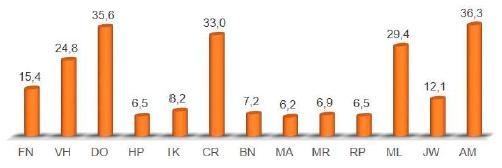
Graphic 1 Percentage distribution of specialist nurses in rehabilitation nursing by nursing conceptions that are fully in line with their practice.
Regarding the concept of person, in the national context, the conceptions that according to specialist/specialized nurses in rehabilitation nursing are fully in line with their practice are those of Afaf Meleis (44.1%), Dorothea Orem (35.0 %), Callista Roy (30.4%), Madeleine Leininger (27.5%), Virginia Henderson (24.5%), Florence Nightingale (14.4%), Jean Watson (9.8%), Moyra Allen (8.8%), Imogene King (8.2%), Martha Rogers (8.5%), Rosemarie Parse (7.8%), Betty Neuman (7.2%) and Hildegard Peplau (7.2% ) (Graph 2).
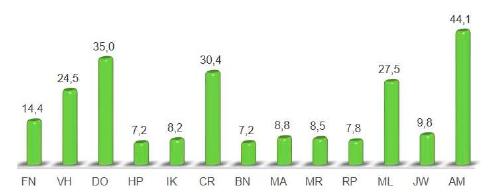
Graphic 2 Percentage distribution of specialist nurses in rehabilitation nursing by the conceptions of people who are fully in accordance with their practice.
With regard to the concept of health, in the national context, the conceptions that according to specialist/specialized nurses in rehabilitation nursing are fully in line with their practice are those of Afaf Meleis (43.1%), Dorothea Orem (38 .2%), Callista Roy (31.0%), Madeleine Leininger (27.8%), Virginia Henderson (24.5%), Jean Watson (15.4%), Florence Nightingale (13.1%), Martha Rogers (8.2%), Hildegard Peplau (7.8%), Imogene King (6.9%), Moyra Allen (7.2%), Rosemarie Parse (6.9%) and Betty Neuman (6, 5%) (Graph 3).
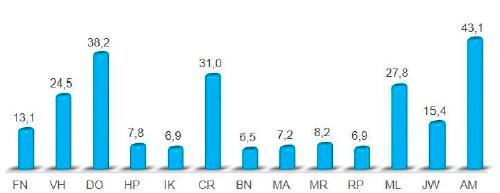
Graphic 3 Percentage distribution of specialist nurses in rehabilitation nursing by health concepts that are fully in line with their practice
With regard to the concept of environment, in the national context, the concepts that according to specialist/specialized nurses in rehabilitation nursing are fully in line with their practice are those of Afaf Meleis (41.8%), Dorothea Orem ( 35.6%, Callista Roy (31.4%), Madeleine Leininger (28.4%), Virginia Henderson (25.8%), Jean Watson (15.4%), Florence Nightingale (13.4%) , Rosemarie Parse (8.5%), Martha Rogers (8.8%), Betty Neuman (7.8%), Imogene King (8.2%), Hildegard Peplau (7.5%) and Moyra Allen (6 .2%) (Graph 4).
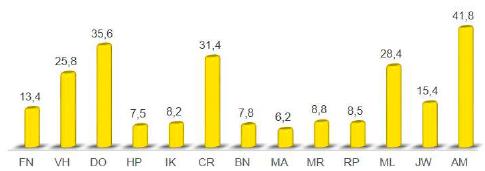
Graphic 4 Percentage distribution of specialist nurses in rehabilitation nursing by environmental concepts that are fully in line with their practice
After analyzing the agreement of specialist/specialized nurses in rehabilitation nursing regarding the conceptions of nursing, person, health and environment, in a national context, we carried out a regional analysis. To this end, the hospital institutions were distributed by the regions of the respective Regional Health Administrations, subsequently carrying out a regional comparison of the distribution of responses. For the purpose of presenting the results, as before, the conceptions that specialist/specialized nurses in rehabilitation nursing most identify with continue to be highlighted.
Figure 1 reflects the nursing conceptions that specialist/specialized nurses qualified as fully in accordance with their practice. Analyzing the results obtained, it is interesting to verify that, despite the agreement with Dorothea Orem's conception of nursing being transversal to all regions of the country, in the North, Center and Alentejo the conceptions of Afaf Meleis and Callista Roy emerge as relevant, in Lisboa e Vale do Tejo, the designs of Madeleine Leininger and Afaf Meleis and in Algarve the other designs that stood out were Madeleine Leininger and Callista Roy.
Still resulting from an analysis by regions, Figure 2 reflects the conceptions of person that specialist/specialized nurses qualified as totally in accordance with their practice. In an analysis of the results obtained, it was found that despite the agreement with Dorothea Orem's conception of person being transversal to all regions of the country, in the North, Center and Alentejo the conceptions of Afaf Meleis and Callista Roy continued to emerge with relevance, in Lisboa e Vale do Tejo the designs of Afaf Meleis and Madeleine Leininger and in the Algarve the other designs that stood out were those of Madeleine Leininger and Callista Roy.
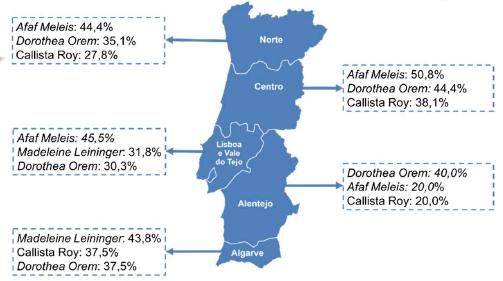
Figure 2 Percentage distribution, by regions, regarding the agreement with the conceptions of person
Keeping the focus on an analysis by regions, Figure 3 reflects the conceptions of health that specialist/specialized nurses qualified as fully in line with their practice. Analyzing the results obtained, it is interesting to verify that, despite the agreement with the health concepts of Afaf Meleis and Dorothea Orem being transversal to all regions of the country, in the North, Centre, Alentejo and Algarve, the conception of Callista Roy emerged with relevance, and in Lisboa e Vale do Tejo, the other conception that stood out was that of Madeleine Leininger.
Still within the scope of an analysis by regions, Figure 4 reflects the conceptions of environment that specialist/specialized nurses qualified as fully in accordance with their practice. As a result of the analysis of the results obtained, it was found that despite the agreement with the concepts of environment by Afaf Meleis and Dorothea Orem being transversal to all regions of the country, in the North, Centre, Alentejo and Algarve, the concept of Callista Roy emerged with relevance, and in Lisboa e Vale do Tejo the other conception that stood out was of Madeleine Leininger.
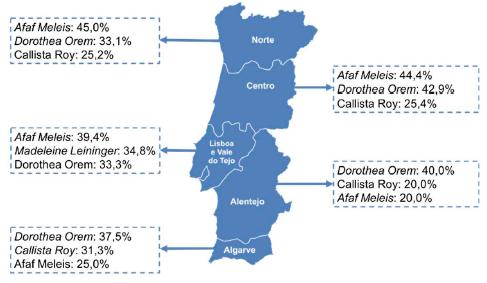
Figure 4 Percentage distribution, by regions, regarding the agreement with the environmental concepts
Considering the results stated in relation to the four metaparadigm concepts, nursing, person, health and environment, we found that in the North, Center and Alentejo there is a unanimous agreement with the conceptions of Afaf Meleis, Dorothea Orem and Callista Roy. In Lisboa e Vale do Tejo, the agreement regarding the four concepts is verified in relation to the conceptions of Afaf Meleis, Dorothea Orem and Madeleine Leininger. In Algarve, the agreement is verified in relation to the conceptions of Dorothea Orem and Callista Roy (Figure 5).
DISCUSSION
Following the analysis of sociodemographic and professional variables, we found that most specialist/specialized nurses who participated in the study were female (71.2%), had an average age of 38.4 years and, predominantly with degree(74.84%). In addition to these results reflecting the sociodemographic reality of nursing professionals in Portugal, they corroborate the data updated by the Ordem dos Enfermeiros7 regarding the area of specialization in rehabilitation nursing. As for the length of professional practice in the specialty area, although it varied between a minimum of 0 years and a maximum of 23 years-old, the average time was 3.7 years. The fact that 43.1% of the nurses who participated in this study do not exercise their professional activity in the specialty area is highlighted, which, once again, reveals the lack of use of the nurses' qualifications8. According to data published by the Order of Nurses, in December 2016, 46.8% of Portuguese nurses with a specialization in rehabilitation nursing practice their professional activity within the scope of general care7, which is in line with the results obtained in this study carried out in the national context.
Although in the documents that support the professional practice of rehabilitation nursing it is clear that in the guidance of the practice of rehabilitation nursing care, the models of self-care and transitions are structuring for the optimization of quality3, this study allowed us to confirm that these models are currently an integral part of the conceptual orientation of specialist nurses in rehabilitation nursing. Effectively, the results obtained in this study make it clear that the conceptions of nursing, person, health and environment that specialist/specialized nurses in rehabilitation nursing qualify as totally in accordance with their practice are those of Afaf Meleis, Dorothea Orem, Callista Roy and Madeleine Leininger.
Although no studies were found that provided numerical data on the nursing models and theories most used by specialist nurses in rehabilitation nursing, the congruence observed in the results makes it clear that these specialist nurses focus on their role in facilitating processes and transitional human experiences; in promoting self-care; in people's adaptive capacities, emphasizing the promotion of health, stability and quality of life, as well as in the activities of assisting, supporting and empowering people to maintain or regain well-being in culturally significant ways.
Similar to the results obtained in a study carried out in the national context with general care nurses, specialist nurses and nurse managers8-9, it is interesting to verify the option for the concepts that best suit the practice is mostly the same, when a nurse specialist in rehabilitation nursing identifies himself with a theoretical nursing framework, he almost always identifies himself in relation to the four metaparadigm concepts: nursing, person, health and environment. In this previous study, the conceptions that obtained greater agreement were those of Virginia Henderson, Afaf Meleis, Dorothea Orem, Madeleine Leininger and Callista Roy. Due to these results, it was realized that, in the context of general care, it is based on Virginia Henderson's theoretical framework that nurses identify the needs and problems of clients and, in relation to whom they plan and carry out the interventions intentionally directed towards the replacement of the person in what he cannot do8-9.
Considering that in the current study, the conceptions that obtained the greatest agreement were those of Afaf Meleis, Dorothea Orem, Callista Roy and Madeleine Leininger, it appears that, given the evolution of the nursing discipline and specialization in rehabilitation nursing, nurses specialists have been committed to changes that they believe will culminate in a systematized practice, and which, therefore, must be based on the scientific and philosophical assumptions that each of the adopted theories expose10. The changes we refer to are mainly related to the “detachment” from Virginia Henderson's theoretical framework and, consequently, to the appropriation of the frameworks of Afaf Meleis, Dorothea Orem and Callista Roy. In addition, compared to the results of the aforementioned study8-9, it is important to highlight that there is less dispersion regarding the agreement of specialist nurses with the different conceptions. In fact, the percentage of specialist/specialized nurses who also consider the conceptions of Florence Nightingale, Virginia Henderson, Hildegard Peplau, Imogene King, Betty Neuman, Moyra Allen, Martha Rogers, Rosemarie Parse and Jean Watson as totally in accordance to their practice.
Although, empirically, at the present time, we are aware that the attempt to sustain professional practice in theoretical frameworks is linked to some contexts, as a result of the initiatives of some specialist nurses in rehabilitation nursing, it is important to highlight it, since constitutes an opportunity for the consolidation of a new paradigm.
This study reinforced the idea that theories that have been shaping the professional practice of specialist nurses in rehabilitation nursing are those of Afaf Meleis, Dorothea Orem, Callista Roy and Madeleine Leininger, and it is based on these theoretical references that nurses will validate on a regular base the real and potential needs and problems of clients and for whom they design and implement rehabilitation nursing care plans, with a view to improving residual functions, maintaining or regaining independence, as well as minimizing the impact of installed disabilities, namely at the level of neurological, respiratory, cardiac and/or orthopedic functions11.
As for the results obtained in relation to theoretical references that are fully in line with practice, there are several possible justifications. On one hand, the training investment made in recent years regarding the relevance of the theoretical frameworks of Afaf Meleis, Dorothea Orem, Callista Roy and Madeleine Leininger, within the professional practice of nurses specializing in rehabilitation nursing, which may even justify the differences between regions. On the other hand, the confirmation by the investigations carried out, in the national and international context, that the conceptions of Afaf Meleis, Dorothea Orem, Callista Roy and Madeleine Leininger are widely applicable, being an essential contribution to the foundation and guidance of the practice of rehabilitation nursing( 4.12-14). In fact, the use of theories to guide practice will contribute to a more efficient and effective performance, where the collection and organization of data, the formulation of diagnoses, the planning and implementation of interventions, as well as the definition of results, will be based on the same connecting thread6,9.
CONCLUSION
The conviction that the professional practice of specialist nurses in rehabilitation nursing should be supported by theoretical frameworks and the lack of studies centered on identifying the conceptual guidelines of these nurses constituted the main motivations for carrying out this study.
In line with the results obtained, we found that the option for the conceptions that best suit the practice is mostly the same, when a specialist nurse identifies with a theoretical framework, he/she is almost always identified in relation to the four concepts metaparadigms: nursing, person, health and environment. In this sense, we found that specialist nurses in rehabilitation nursing qualified as fully in accordance with their practice the concepts of Afaf Meleis, Dorotfhea Orem, Callista Roy and Madeleine Leininger.
Given the relevance of these theoretical frameworks for sustaining the professional practice of specialist nurses in rehabilitation nursing, its incorporation in the contexts of practice is a challenge, because, despite the theoretically significant evolution, only the consolidation of the theoretical foundations will allow a systematic and intentional practice.
Despite the contributions of this study, we assume as a limitation the fact that the sampling technique was non-probabilistic, with the possibility that the profile of specialist nurses who participated could have influenced the results.
REFERÊNCIAS
1 Watson J. Elucidando a disciplina de enfermagem como fundamental para o desenvolvimento da enfermagem profissional. Texto & Contexto Enferm. [Internet]. 2017 [cited 2018 Jun 24];26(4):editorial. Available from: http://www.scielo.br/pdf/tce/v26n4/0104-0707-tce-26-04-0000.pdf [ Links ]
2 McCrae N. Whither Nursing Models? The value of nursing theory in the context of evidence-based practice and multidisciplinary health care. J Adv Nurs. [Internet]. 2011 [cited 2018 Jun 26];68(1):222-229. Available from: https://www.ncbi.nlm.nih.gov/pubmed/21906131 [ Links ]
3 Portugal. Ministério da Saúde. Regulamento n.º 350/2015, de 22 de junho de 2015. Regulamento dos Padrões de Qualidade dos Cuidados Especializados em Enfermagem em Enfermagem de Reabilitação. Diário da República. 2015 jun. 22; 2.ª série. p 16655-16660. Available from: https://www.ordemenfermeiros.pt/arquivo/legislacao/Documents/LegislacaoOE/RegulamentoPadQualidadeCuidEspecializEnfReabilitacao_DRJun2015.pdf [ Links ]
4 Andrade LT, Favoretto NB, Souza DRP, Gimenes FRE, Faleiros F. Diagnósticos, resultados e intervenções de enfermagem para indivíduos com lesão medular. In: NANDA International, Inc.; Herdman TH, Napoleão AA, Lopes CT, Silva VM, organizadoras. PRONANDA Programa de Atualização em Diagnósticos de Enfermagem: Ciclo 6. Porto Alegre: Artmed Panamericana; 2018. p.9-45. [ Links ]
5 Carpinteira SF, Sanchez MC, Pereira MJ, Castro MR. The theoretical models in nursing services in vision of nurses of assistance: an exploratory study. ACC CIETNA [Internet]. 2014 [cited 2018 Jun 29];2(1):69-83. Available from: http://repositorio.usat.edu.pe/bitstream/usat/50/4/Acc%20Cietna%20Vol2%20N%C2%B01%20P7.pdf [ Links ]
6 McEwen M, Wills EM. Bases Teóricas de Enfermagem. 4ªed. Porto Alegre (RS): Artmed; 2016. [ Links ]
7 Ordem dos Enfermeiros. Membros ativos especialistas em reabilitação. Lisboa: Ordem dos Enfermeiros; 2016. Available from: https://www.ordemenfermeiros.pt/arquivo/colegios/Documents/2017/DadosEstatisticos2016_Reabilitacao.pdf [ Links ]
8 Ribeiro OM. Contextos da Prática Hospitalar e Conceções de Enfermagem: Olhares sobre o real da qualidade e o ideal da excelência no exercício profissional dos enfermeiros. [Tese de Doutoramento]. Porto, Instituto de Ciências Biomédicas Abel Salazar, Universidade do Porto; 2017. [ Links ]
9 Ribeiro OM, Martins MM, Tronchin D, Forte, E. The pespective of portuguese nurses on nursing metaparadigmatica concepts. Texto & Contexto Enferm. [Internet]. 2018 [cited 2018 July 17];27(2):e3970016. Available from: http://www.scielo.br/pdf/tce/v27n2/en_0104-0707-tce-27-02-e3970016.pdf [ Links ]
10 Huitzi-Egilegor JX, Elorza-Puyadena MI, Urkia-Etxabe JM, Asurabarrena-Iraola C. Implementation of the nursing process in a health area: models and assessment structures used. Rev Latinoam Enferm. [Internet]. 2014 [cited 2018 Jun 29];22(5):772-777. Available from: https://www.ncbi.nlm.nih.gov/pmc/articles/PMC4292680/ [ Links ]
11 Portugal. Ministério da Saúde. Regulamento n.º 125/2011, de 18 de fevereiro de 2011. Regulamento das Competências Específicas do Enfermeiro Especialista em Enfermagem de Reabilitação. Diário da República. 2011 fev. 18; 2.ª série. p 8658-8659. Available from: https://www.ordemenfermeiros.pt/arquivo/legislacao/Documents/LegislacaoOE/Regulamento%20125_2011_CompetenciasEspecifEnfreabilitacao.pdf [ Links ]
12 Martins MM, Faria AC, Ribeiro OM, Monteiro MC, Reis MG. A longa transição do cliente com AVC sustentada no referencial teórico de Meleis. In: Figueiredo NM, Machado WC, Martins MM. Reabilitação: Nômades em busca de sentido para o cuidado da pessoa com deficiência adquirida. 1ªed. Curitiba: CRV; 2018. p.159-194. [ Links ]
13 Martins MM, Monteiro MC, Ribeiro OM, Faria AC, Ferreira MS. Centralidade no autocuidado da pessoa com tetraplegia à luz do referencial teórico de Orem. In: Figueiredo NM, Machado WC, Martins MM. Reabilitação: Nômades em busca de sentido para o cuidado da pessoa com deficiência adquirida. 1ªed. Curitiba: CRV; 2018. p.195-221. [ Links ]
14 Martins MM, Ribeiro OM, Monteiro MC, Faria AC, Silva JM. Olhares sobre os cuidados de enfermagem à pessoa com paraplegia: contributos do modelo de Callista Roy. In: Figueiredo NM, Machado WC, Martins MM. Reabilitação: Nômades em busca de sentido para o cuidado da pessoa com deficiência adquirida. 1ªed. Curitiba: CRV; 2018. p.223-255. [ Links ]
Received: July 31, 2018; Accepted: November 26, 2018; Published: December 06, 2018











 texto em
texto em 


